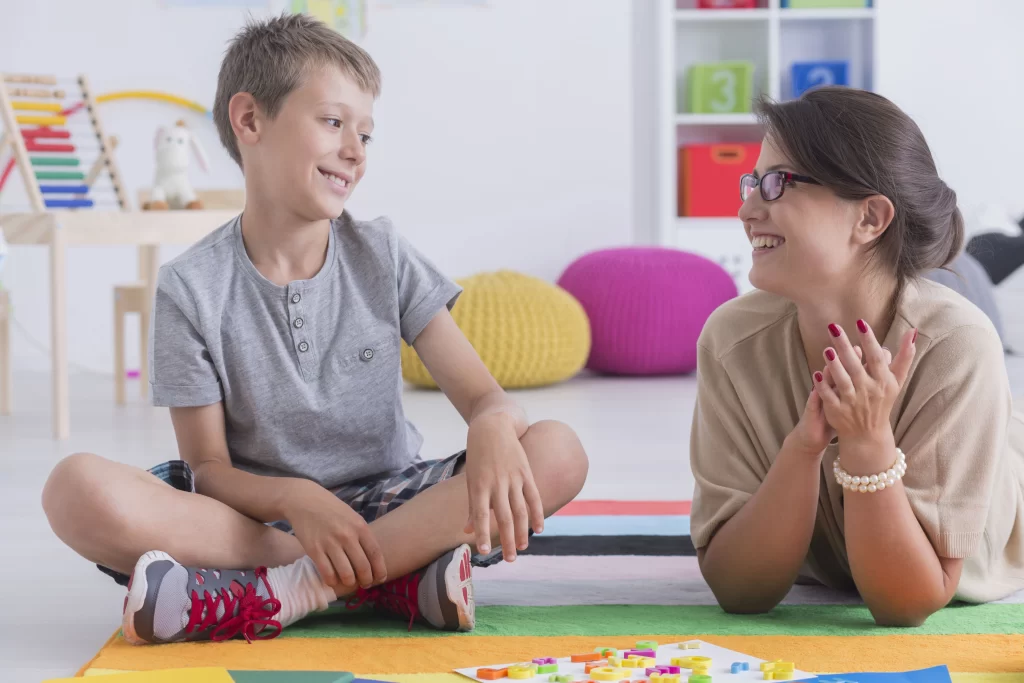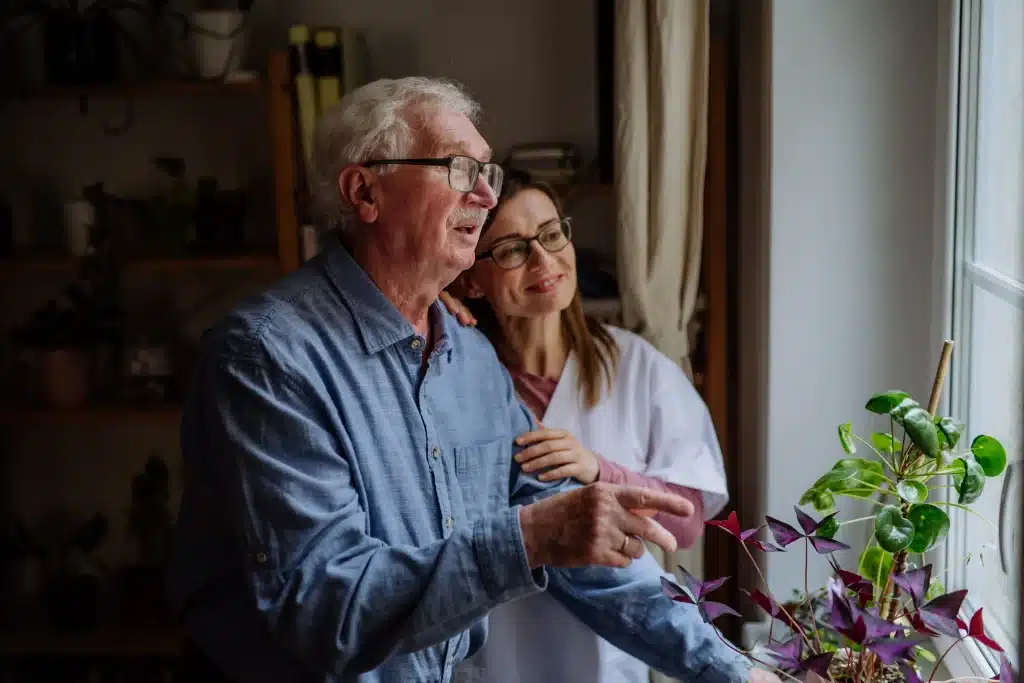Meaning of PBS in Health and Social Care
Positive Behaviour Support is designed to improve the quality of life for people, particularly those with learning disabilities or behaviours that challenge, by providing tailored support that promotes positive behaviours and reduces the need for restrictive practices.
PBS is based on understanding the reasons behind behaviours of concern and addressing those needs through proactive, positive behaviour support strategies. PBS focuses on reducing behaviour that challenges through tailored behaviour support plans and is involved in creating supportive environments where a person is provided with alternative behaviours that benefit them. Therefore, PBS focuses on understanding the factors contributing to challenging behaviours.
Principles of Positive Behaviour Support (PBS)
Positive Behaviour Support is a strength-based approach consisting of many key elements, outlining strategies that address challenging behaviours to create a supportive environment. PBS is built upon the understanding that behaviours that challenge serve a purpose for the person experiencing the specific behaviour.
Therefore, a few key principles of Positive Behaviour Support focus on creating a positive and inclusive environment that helps understand the individual and provide them with the required support.
Person-Centred Approach
PBS supports the concept of care that people should be at the centre of their own support. This involves ensuring that people experiencing challenging behaviours are included as much as possible in planning and implementing support strategies. Additionally, Applied Behaviour Analysis (ABA) is often used to develop behaviour support plans in the context of a person-centred approach.
The person-centred approach underlines the importance of respecting one’s dignity and autonomy. Additionally, this helps identify the person’s strengths and abilities and areas for skill development, which professionals can later help enhance. The individual’s family members receiving support can also be involved in the PBS planning.
This approach allows the strategies and behaviour support plan to be tailored to the person’s needs, which leads to positive outcomes and improved well-being.
Leaf Complex Care has multidisciplinary in-house therapists who provide Positive Behaviour Support, Occupational therapies and Speech and Language support. Read more about their expertise and the specialised support they provide.
Positive Reinforcement
Positive performance is at the core of PBS, which involves providing positive consequences for a specific behaviour that increase the likelihood of that behaviour being repeated in the future.
It’s crucial to remember that PBS, with its proactive approach, focuses on building and developing skills instead of punishing people for their behavioural challenges. Moreover, PBS believes that negative reinforcement increases challenging behaviour and does not improve a person’s quality of life.
Therefore, positive reinforcement can be a powerful tool to help people learn new patterns and ways to communicate their needs while eliminating challenging behaviour. Lastly, when professionals use positive reinforcement during their time together, people are more likely to feel empowered to engage in positive behaviour and develop their skills.
Partnership and Teamwork
The strength and nature of the relationship between the support workers and the person requiring support are crucial. Although support workers and carers should always strive to establish a professional interpersonal connection, it’s vital for the person needing support to see the carer as a friend. This builds trust, comfort, and rapport that can later benefit the person’s behaviour and overall support.
Building this relationship can also help identify specific behaviours, likes, dislikes, potential risks and triggers, which will later benefit the proactive strategies of Positive Behaviour Support.

Assessment-Based Intervention
Assessment-based intervention is a crucial principle of Positive Behaviour Support and one of the main reasons the approach is practical when it comes to supporting people.
Assessing and data collection on a person’s behaviours that challenge helps PBS professionals to:
- Understand the reason and the unmet need for a specific challenging behaviour
- Develop and implement strategies for a Positive Behaviour Support plan
- Gain insight into the progress of the support plan
Hence, involving family members and the people requiring support is essential while developing a PBS plan.
Being Preventative, Not Just Reactive
Positive Behaviour Support uses proactive strategies to reduce behaviours that challenge from occurring. Additionally, these strategies build supportive environments that promote positive behaviours and develop the right plan to support autistic people or people living with a learning disability.
The Positive Behaviour Support proactive strategies can include:
- Environmental modifications
- Supportive relationships
- Providing opportunities for choice
- Positive reinforcement
- Building new skills or leveraging on existing ones
- Structured routines
Outcome Based Approach
Positive Behaviour Support is an outcome-based approach, which means that PBS strategies are developed to achieve specific goals or outcomes that will cause a positive change. This might include:
- Minimising or eliminating challenging behaviour
- Providing healthy alternatives to meet needs
- Enhancing positive social interactions
- Positive reinforcement
- Improving the general quality of life

The outcome of Positive Behaviour Support is measured by the person’s behaviour over time. Therefore, PBS focuses not solely on implementing PBS strategies but on the actual outcomes of those interventions. Remembering that this approach underlines the importance of measuring progress and making adjustments based on the person’s needs is crucial
Positive Behaviour Support Plan (PBS Plan)
A Positive Behaviour Support Plan is a structured framework that promotes positive change and reduces challenging behaviours, particularly for people with learning disabilities, autism, or mental health needs.
PBS Plans, grounded in respect, autonomy, and evidence-based practice, aim to understand and manage the root causes of behavioural challenges rather than merely responding to them. By encouraging active participation from people in their own support strategies and nurturing strong partnerships with care professionals, these plans create an inclusive environment that encourages positive behaviours and skill development.
What Should be Included in the PBS Plan?
A well-constructed PBS plan includes several key elements:
- Functional Behavior Assessment (FBA) – Involves collecting data, observations, and information to understand the triggers and functions of behavioural challenges.
- Proactive Strategies – Prevent behaviours by modifying the environment and teaching new skills.
- Replacement Skills – Teaching functional skills to replace behaviours of concern.
- Consequence Strategies – Outline how to respond to behavioural challenges in a way that does not reinforce them while promoting positive behaviours.
- Long-Term Strategies – Include ongoing support and skill development to ensure sustainable behaviour change.
The process of implementing a Positive Behaviour Support (PBS) plan includes the following steps:
- Assessment: Conducting a comprehensive evaluation of the person’s behaviours, focusing on identifying triggers (antecedents) and consequences.
- Plan Development: Collaboratively creating the PBS plan with input from stakeholders, including family members and care providers. This plan outlines strategies and supports to be implemented.
- Training and Support: This step provides training to everyone involved on the support to ensure consistent implementation of the plan. This includes skill-building, environmental adjustments, and positive reinforcement techniques.
- Monitoring and Evaluation: Regularly tracking behaviour and collect data to monitor the plan’s effectiveness, making adjustments as necessary.
How Leaf Complex Care is Applying the Principles of PBS
Leaf Complex Care aims to support people by providing person-centred care rooted in PBS principles. We understand the value of Positive Behaviour Support and firmly believe in its power to make a difference in people’s quality of life.
Our support workers are trained in PRO-ACT SCIPr, a ‘whole approach’ to supporting people with or at risk of experiencing behaviours of concern. This approach underlines proactive strategies to reduce the need for reactive strategies.
To see how we can work together and bring you closer to the support we provide, please watch what the families of the people we support have to say.
Please click here to learn more about Richard’s story and care journey with Leaf Complex Care.
We provide CQC-regulated care in Bristol, South East, Somerset and the Midlands.
If you want to learn more about Positive Behaviour Support or discover how we can help you, please get in touch with our team.

